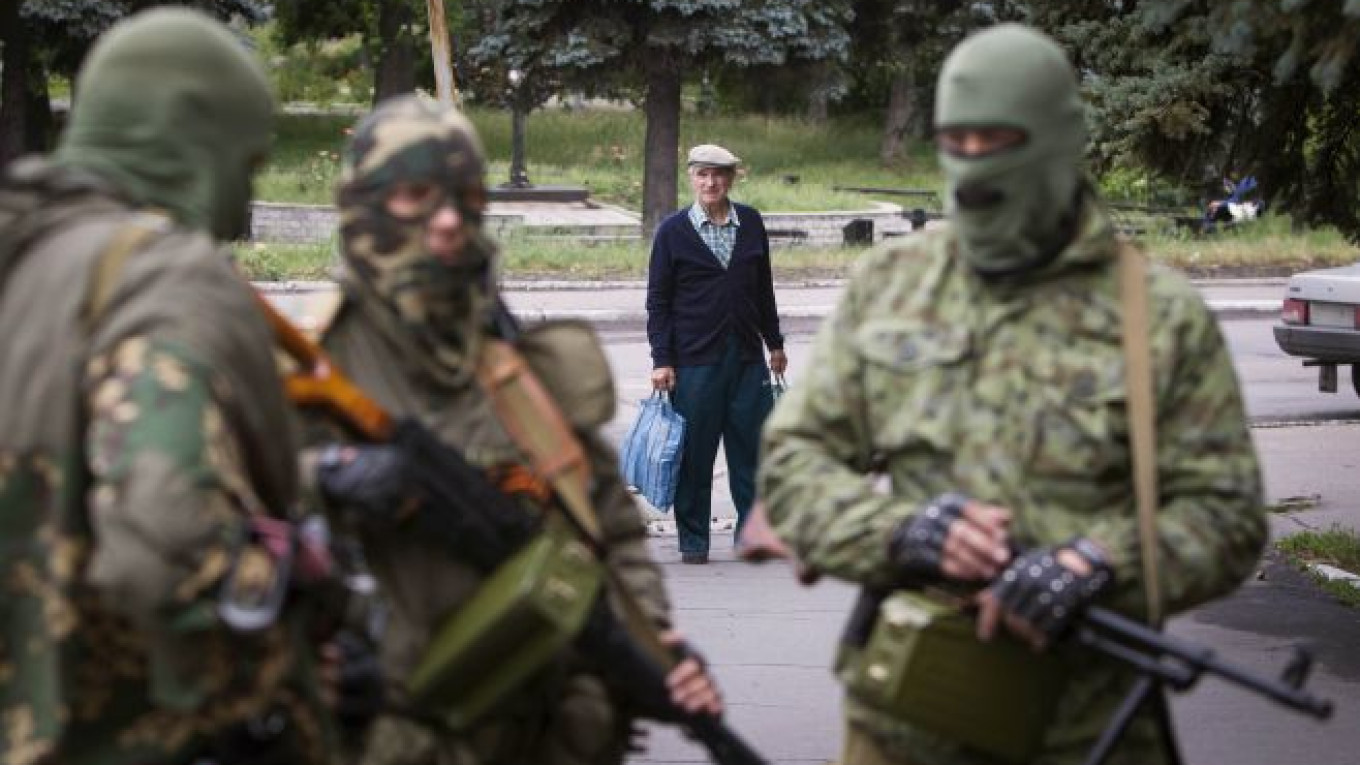Ukrainian President Petro Poroshenko has denounced as "unacceptable" reports of tanks rolling into eastern Ukraine across the Russian border in a telephone conversation with counterpart Vladimir Putin.
Ukrainian Interior Minister Arsen Avakov said that a convoy of Russian armored vehicles, including three tanks, crossed the border into Ukraine on Thursday and were engaged by Ukrainian troops, Ukraine's Liga.Net reported.
Poroshenko held an emergency meeting with security officials on Thursday to discuss how to respond to what appears to be a renewed level of tension in the conflict in eastern Ukraine, his office said in an online statement.
"Today in the east of Ukraine, militants for the first time have used tanks, which, according to Ukrainian intelligence services, have come from the side of the Russian Federation," the statement said.
Videos posted online also showed tanks rolling along the streets in Ukrainian towns.
Poroshenko's spokesman Svyatoslav Tsegolko said Thursday night on his Facebook page that during a telephone conversation with Putin earlier in the evening, Poroshenko had "called the situation unacceptable if tanks are coming into the territory of our country across the state Russian-Ukrainian border," — capitalizing the word "unacceptable."
Moscow did not immediately respond to the accusation, having repeatedly denied sending its troops or weapons to eastern Ukraine over past months.
In a brief statement on its website, the Kremlin later said the Poroshenko had "informed V. Putin about his plans for resolving the situation in southeastern Ukraine," and that the two presidents discussed their countries' bilateral relations.
Before Tsegolko's post, Poroshenko's office initially made a similar statement, saying that the conversation Thursday evening was "substantial and lengthy" but without specifying details.
Ukrainian Foreign Minister Andrii Deshchytsia said Thursday that the conflict-resolution plan included formal recognition of the legitimacy of Poroshenko's presidency, a ceasefire by separatists, and the creation of a safe passage for civilians to escape the violence, RIA Novosti reported.
Deshchytsia also said Poroshenko had offered to guarantee the status of the Russian language in the region — a linguistic autonomy that Moscow had accused the Ukrainian government of trying to suppress as an instance of the supposed persecution of ethnic Russians – and to issue separatists who had not shed the blood of Ukrainian troops or civilians with an amnesty, RIA Novosti reported.
The tank incursion, if true, would signal an escalation of the months-long violence in eastern Ukraine between government troops and pro-Moscow separatists. While separatists have used armored personnel carriers they had reportedly seized from Ukrainian troops, there had been no indication that the rebels possessed tanks.
Ukrainian officials have repeatedly urged Russia to seal its border with Ukraine to block the "export" of armed men and weapons across the frontier, but Moscow has shrugged off the appeals and denied any involvement.
The Ukrainian interior minister said that his service had "observed convoys of armored personnel carriers with armored vehicles and cannons," Liga.net reported.
"Today we saw three tanks that, according to our information, crossed the border and were in [the town of] Snizhne this morning," Avakov was quoted as saying. Two of the tanks then proceeded toward Horlivka, where they came under fire from government troops, he said.
Poroshenko's office said in a report about the president's meeting with security officials that Ukrainian troops have regained control over a 100-kilometer stretch of the border.
See also:
Ukraine President Poroshenko Calls For Ceasefire in Country's East
A Message from The Moscow Times:
Dear readers,
We are facing unprecedented challenges. Russia's Prosecutor General's Office has designated The Moscow Times as an "undesirable" organization, criminalizing our work and putting our staff at risk of prosecution. This follows our earlier unjust labeling as a "foreign agent."
These actions are direct attempts to silence independent journalism in Russia. The authorities claim our work "discredits the decisions of the Russian leadership." We see things differently: we strive to provide accurate, unbiased reporting on Russia.
We, the journalists of The Moscow Times, refuse to be silenced. But to continue our work, we need your help.
Your support, no matter how small, makes a world of difference. If you can, please support us monthly starting from just $2. It's quick to set up, and every contribution makes a significant impact.
By supporting The Moscow Times, you're defending open, independent journalism in the face of repression. Thank you for standing with us.
Remind me later.


